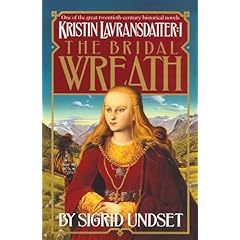With the ‘domestic epic’, a sweeping drama set against a carefully studied social background, she broke a new ground. Undset turned away from the sentimental style of national romanticism and wanted to re-create the realism of the Icelandic sagas and write so vividly, that “everything that seem(s) romantic from here – murder, violence, etc becomes ordinary – comes to life,” as the author explained. . . . Undset’s emphasis on women’s biological nature, and her view that motherhood is the highest duty (to which) a woman can aspire, has been criticized by feminists as reactionary. —Kirjasto
I’m not surprised that feminist critics might not appreciate Sigrid Undset’s Kristin Lavransdatter. What a story! I actually began reading this story of a medieval Norwegian mother and wife a long time ago, but found myself unable to stay with it. This time I read it in three separate paperback books, The Bridal Wreath (Part 1), Mistress of Husaby (Part 2), and The Cross (Part 3). I think the three separate books made it more digestible and less intimidating. Anyway, this time I not only read the entire book, over a thousand pages, but I enjoyed it so much that I plan to add it to my list of the 100 Best Fiction Books Ever Written.

The Bridal Wreath tells the story of Kristin’s childhood, her growth into womanhood, her betrothal, her sin and loss of honor, and her marriage. For better or for worse, the decisions that Kristin makes in this first book determine the remainder of the events of her life and her willfulness in choosing her own husband throws a shadow over even the happiest of times in her later life. Kristin is a likeable protagonist, but very much a fallible one. Book 1 of this trilogy is about rebellion and how easy it is to fall into sin, how justifiable it seems. The story also demonstrates how one sin leads to another and “what a tangled web we weave.”

Nevertheless, Kristin becomes The Mistress of Husaby, the medieval estate of her husband, Erlend. She gives her husband sons, seven sons. They are rich in land, in friends, in family. But their character, or lack thereof, comes back to haunt the two of them and their marriage again and again. Having started off on the wrong foot, so to speak, Kristin and her husband can never manage to live in harmony for long. Erlend is careless and untrustworthy, just as he was when Kristin married him. Kristin is often shrewish and disrespectful in response to her husband’s irresponsibility. Still they build a marriage that, just barely, outlasts the storms of adultery, abandonment, imprisonment, sickness, and disgrace.

In Book 3, The Cross, Kristin is getting old for a woman of the thirteenth and fourteenth centuries. She’s in her forties as the story progresses. Her sons are growing up, and her husband is growing old. Kristin must learn the lesson of self-denial and letting go of those whom she loves fiercely and somewhat possessively. Perhaps as my children grow up and begin to leave the nest in little ways, I identify with Kristin in this book most of all. She wants so much to shield her sons from harm and from difficulty, but most of all from themselves and the trouble they will bring upon themselves by their own sins and bad decisions. Oh, I do want the same thing.
“When you yourself had borne a child, Kristin, methought you would understand,” her mother had said once. Now, she understood that her mother’s heart had been scored deep with memories of her daughter, memories of thoughts for her child from the time it was unborn and from all the years a child remembers nothing of, memories of fear and hope and dreams that children never know have been dreamed for them, until their own time comes to fear and hope and dream in secret —
But Kristin learns that her sons have their own dreams and their own unwise decisions to make. And she can only pray for them and leave them to the mercy of God. She comes to realize, too, that her own prayers have always been answered by a faithful God, that she has always been in His hand, even when He allowed her to follow the sinful desires of her own heart.
Never, it seemed to her had she prayed to God for aught else than that He might grant her her own will. And she had got always what she wished—most. And now she sat here with a bruised spirit—not because she had sinned against God, but because she was miscontent that it had been granted her to follow the devices of her own heart to the journey’s end.

Oh, that the Lord would say “no” and put a barrier in my way when I ask Him for what I think I want but what He does not will. And I pray the same for my children. But sometimes He sees that we need to experience the fruits of our willful decisions before we can see clearly that His will is best.
Kristin Lavransdatter is a wonderful book for wives and mothers especially, for those of us who sometimes struggle with those roles and who often delight in the same. If it’s slow going at first, please persist. The language is beautiful, but somewhat archaic and stilted. I think you’ll find the book worth getting through any initial difficulties.
Visit Semicolon’s Amazon Store for more great book recommendations.
I agree.
Any thoughts on the different translations available on this one? I’ve begun it a twice and given up–I confess I watched the movie (of the first one) instead! (Don’t tell!) I wonder if there is a less archaic translation that I might prefer. BTW mine is the single volume…I’ll have to see if how yours differs.
Thanks for the excellent review. You’ve peaked my interest again.
R
The ones in the pictures are the ones I read, translated by Charles Archer. The language is the language that’s in the quotations I posted, properly medieval, but not too difficult to understand, I don’t think.
I’m afraid I’m not familiar with any other translations that might be available. Is anyone else?
I was just reading recommendations for this book in Gladys Hunt’s book, Honey For a Woman’s Heart. It’s good to know it can be purchased in three volumes!
Thank you for this recommendation! I just got it from the library and have had a hard time putting it down (and with two toddlers, a hard time picking it up again. 😉 ) It’s been a long time since I found a fiction book so engrossing.
I just finished reading the first book in this series for my European literature course at my university–what a book! Thankfully, when I came across the book at a local used bookstore, they didn’t let me buy just one (they sold them only as a set!). Thanks for your summary and recommendation. I’ll definitely have to get to the other two once exams are over! 🙂 (I really enjoy your blog, too!)
I read this a few years after I got out of college. It was one of my favorite books at the time. Now, over 20 years later, with two teenagers and a 7 year old, it looks like it’s probably time for me to read this again!
For those of you having difficulty with the language, there is an updated translation by Tiina Nunnally. It’s published by Penguin, and is only available in paperback (unfortunately.) It was done 1997-2000. I haven’t read either version, but have heard that Nunnally’s is much better and that the old one (Archer’s) left some things out.
Pingback: Saturday Review of Books Challenge « 3m@3am
Pingback: 1morechapter.com » Blog Archive » Saturday Review of Books Challenge
The reviewer wrote: “The language is beautiful, but somewhat archaic and stilted. I think you’ll find the book worth getting through any initial difficulties.”
I recommend the vastly improved and more readable translation from Tiina Nunnally. See http://www.ou.edu/worldlit/essays/Nunnally-RemovingtheGrime.html for Nunnally’s comparison between her own translation and the faux-ye-olde-english translation by Archer that, until around 2000, was the only option for readers of English.
Pingback: Mindy Withrow » Kristin Lavransdatter
Great plot summary, Sherry. I agree with your commenters that the Nunnally translation is remarkable, not just readable but a gorgeous use of language. I’ve posted my brief review at http://mindywithrow.com/?p=1011. I’ll be recommending this book to anyone who will listen — and I’m a feminist! ;o)
Pingback: Best Fiction Books – Top 15 Pieces | Most Popular Books